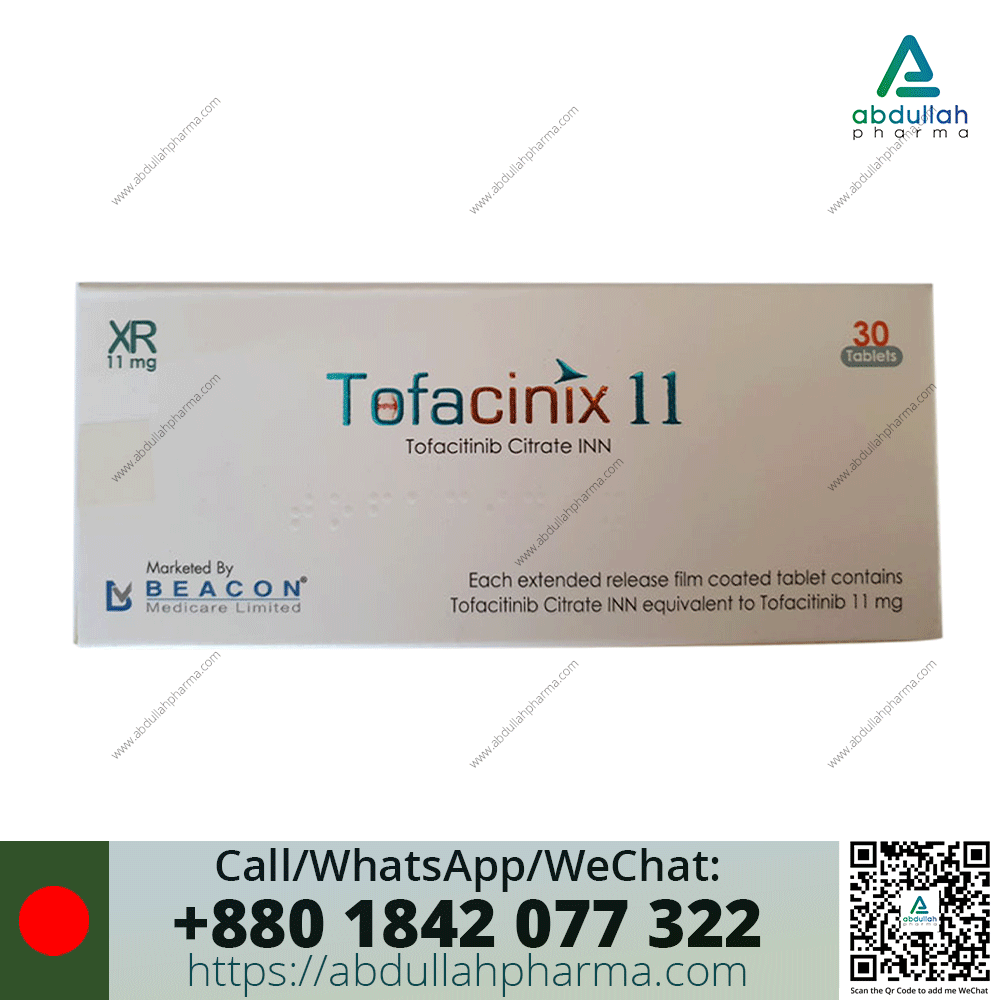Tofacinix Tablet (Extended Release)
Indications
Psoriatic Arthritis: Tofacitinib is indicated for the treatment of adult patients with active psoriatic arthritis who have had an inadequate response or intolerance to methotrexate or other disease-modifying antirheumatic drugs (DMARDs).
Ulcerative Colitis: Tofacitinib is indicated for the treatment of adult patients with moderately to severely active ulcerative colitis (UC).
Therapeutic Class
Pharmacology
Tofacitinib is a partial and reversible janus kinase (JAK) inihibitor that will prevent the body from responding to cytokine signals. By inhibiting JAKs, tofacitinib prevents the phosphorylation and activation of STATs. The JAK-STAT signalling pathway is involved in the transcription of cells involved in hematopoiesis, and immune cell function. Tofacitinib works therapeutically by inhibiting the JAK-STAT pathway to decrease the inflammatory response. However, there is evidence to suggest that it may also achieve efficacy via other pathways as well.
Dosage & Administration
Psoriatic Arthritis (in combination with nonbiologic DMARDs): Tofacitinib 5 mg twice daily or Tofacitinib 11 mg once daily. Recommended dosage in patients with moderate and severe renal impairment or moderate hepatic impairment is Tofacitinib 5 mg once daily.
Ulcerative Colitis: Tofacitinib 10 mg twice daily for at least 8 weeks; then 5 or 10 mg twice daily. Discontinue after 16 weeks of 10 mg twice daily, if adequate therapeutic benefit is not achieved. Use the lowest effective dose to maintain response.
Interaction
- Potent inhibitors of Cytochrome P450 3A4 (CYP3A4) (e.g., Ketoconazole)
- Recommended dose is Tofacitinib 5 mg once daily: One or more concomitant medications that result in both moderate inhibition of CYP3A4 and potent inhibition of CYP2C19 (e.g., fluconazole)
- Recommended dose is Tofacitinib 5 mg once daily Potent CYP inducers (e.g.Rifampin): May result in loss of or reduced clinical response.
Side Effects
Pregnancy & Lactation
It is not known whether Tofacitinib is excreted in human milk. Because many drugs are excreted in human milk and because of the potential for serious adverse reactions in nursing infants from Tofacitinib, a decision should be made whether to discontinue nursing or to discontinue the drug, taking into account the importance of the drug for the mother
Precautions & Warnings
- Serious Infections: Avoid use of Tofacitinib during an active serious infection, including localized infections.
- Gastrointestinal Perforations: Use with caution in patients that may be at increased risk.
- Laboratory Monitoring: Recommended due to potential changes in lymphocytes, neutrophils, hemoglobin, liver enzymes and lipids.
- Immunizations: Live vaccines: Avoid use with Tofacitinib.
- Do not initiate Tofacitinib if absolute lymphocyte count <500 cells/mm3, an absolute neutrophil count (ANC) <1000 cells/mm3 or hemoglobin <9 gm/dL.
Use in Special Populations
Geriatric Use: The frequency of serious infection among Tofacitinib-treated subjects 65 years of age and older was higher than among those under the age of 65. As there is a higher incidence of infections in the elderly population in general, caution should be used when treating the elderly.
Moderate and severe renal impairment or moderate hepatic impairment: half the total daily dosage recommended for patients with normal renal and hepatic function.
Storage Conditions
/*54745756836*/













Reviews
There are no reviews yet.